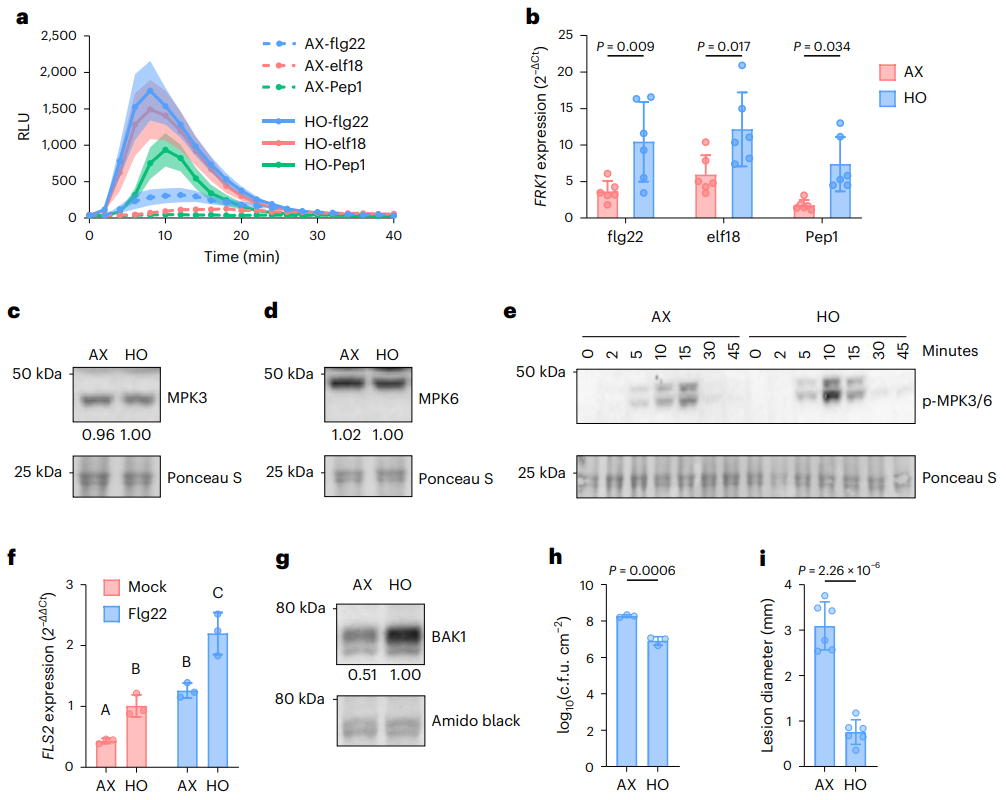On August 17, 2023, Nature Plants published online a research paper entitled "A critical role of a eubiotic microbiota in gating proper immunocompetence in Arabidopsis" by Shengyang He's team at Duke University in the United States and their collaborators. Using a peat-based gnotobiotic plant growth system, this study found that germ-free plants lacked age-dependent immunity and normal pattern-triggered immunity (PTI) responses, but leaf synthetic microbiota largely restored these deficiencies. At the same time, the dysbiotic microbiota can overstimulate the expression of immune genes, revealing the important role of eubiotic microbiota in regulating the normal immunity of plants.
The aboveground and underground parts of terrestrial plants host a variety of microorganisms, which together constitute the plant microbiota and exist on the surface of the plant or inside the plant. It has been suggested that plants may have evolved mechanisms to select and maintain microbiota abundance, composition, and function in order to achieve homeostasis. At the same time, genetically induced microbiota dysbiosis is detrimental to plant health, suggesting that a properly assembled microbiota (i.e., eubiotic microbiota) may be critical for plant health and survival. Although individual or groups of microbial communities have been shown to improve nutrient uptake, growth, and resistance to abiotic and biotic stresses, the contribution of a plant's entire native microbiota to plant function is unclear. Furthermore, while many studies have shown that microbes can ectopically stimulate or suppress plant immune responses, the fundamental question of whether the entire pre-existing microbiota remains unanswered for the normal response of plant immune responses. Furthermore, although many studies have shown that microorganisms can ectopically stimulate or suppress plant immune responses, the fundamental question of whether the entire pre-existing microbiota is required for the normal response of plant immune responses remains unanswered.
The team previously discovered two peat-based gnotobiotic plant growth systems, FlowPot and GnotoPot, and two synthetic bacterial communities, a eubiotic community from healthy Arabidopsis leaves and a dysbiotic community from min7 fls2 efr cerk1 quadruple mutant leaves, respectively. This mutant lacks the ability to maintain a eubiotic endophytic bacterial community. Using a peat-based plant growth system, they found that Arabidopsis grown in the absence of a natural microbiota lacked an age-dependent maturation pattern of plant immune responses.
Transcriptome analysis revealed a widespread loss of expression of PTI/SA defence genes in axenic (AX) plants compared with holoxenic (HO) plants, thereby affecting both induced and basal innate immunity in plants. Meanwhile, the AX plants showed high susceptibility to infection by the bacterial pathogen Pseudomonas syringae, and its level of PTI-associated immune response was significantly reduced. These results suggest that germ-free plants can impair multiple PTI immunophenotypes, including production of ROS, phosphorylation of MPK3/6, receptors and co-receptors, etc.

Using a synthetic microbiota of 48 culturable bacterial strains from within the leaves of healthy Arabidopsis plants, the study showed that the synthetic microbiota was essentially able to restore immunity in germ-free plants similar to that of plants inoculated with soil-derived microbiota.
During the development and optimization of the peat-based aseptic system, the team found a correlation between the level of microbial-mediated immunity recovery and the concentration of LS nutrient medium. The study found that microbiota-mediated immunity was dependent on nutrition, but microbiota-mediated immunity was also suppressed by rich nutrient conditions, especially high nitrogen levels, suggesting a tripartite interaction between host, microbiota, and abiotic environment.
Finally, the study found that a dysbiotic leaf microbiota consisting of 52 members overstimulated the expression of immune-related genes, including FRK1, PR1, and CYP71A12, among others. Meanwhile, transcriptome analysis revealed that 609 upregulated genes out of 774 were shown to be related to biotic stress and immunity.
In conclusion, using a previously established peat-based eubiotic plant growth system, this study found that a plant's pre-existing endogenous microbiota plays an important role in the normal immune response of the plant. Germ-free plants exhibit deficiency in multiple aspects of age-dependent immunity and PTI, while a dysbiotic microbiota overstimulates the expression of immune genes. These results provide strong evidence for a causal role of eubiotic microbiota in regulating normal and age-dependent immunity in plants.
Reference:
Paasch, B.C., Sohrabi, R., Kremer, J.M. et al. A critical role of a eubiotic microbiota in gating proper immunocompetence in Arabidopsis. Nat. Plants (2023).